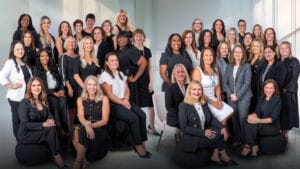“Girls on the Run” is part three of a series about local views on women’s rights issues facing local businesses. Part one addresses the Ban Bossy campaign and part two addresses the Paycheck Fairness Act.
There are many groups dedicated to the empowerment and well-being of pre-teen and teenage girls. Many of these groups are receiving more attention because of the spotlight on equal pay, Ban Bossy, Lean In and women’s rights in general. One such group is Girls on the Run, a nonprofit company dedicated to helping girls achieve their full potential.
Girls on the Run is designed to help pre-teen girls discover self-respect and self-accomplishment. The program spans 12 weeks with meetings twice a week. The curriculum is divided into three parts: how girls can better understand themselves, how they value relationships and teamwork and how they connect with and shape the world at large.
The program also incorporates running, being physically active and a 5k run at the end. Meagan Kukowski, the executive director for the Maricopa County council, explains that the girls never run just to run, but instead the running serves as a role to embrace a healthy lifestyle and helps the girls complete lessons and activities that reinforce the curriculum.
Kukowski explains that the 5k race does not emphasize winning and that it is not timed. All of the girls wear the number one. “The race gives them a tangible sense of achievement and a framework for setting and achieving goals in life. Many of the girls start by saying that there is no way they can run three miles, and when they achieve that goal, they get to see that they could do it,” says Kukowski.
Girls on the Run also addresses important social issues that affect girls such as their appearance, negative self-talk and stereotypes. Kukowski explains that the program addresses the importance of appearance by telling the girls to unplug negative self-talk and talk about others. “We teach them to think positively towards ourselves and others we come in contact with,” states Kukowski. She also explains that they encourage girls to reach outside of the girl box. Despite pressure girls may feel from society, friends and the media to look and act different, Girls on the Run “teaches girls to identify these problems and to embrace who they are.”
Kukowski also explains that the volunteers are great role models for the girls. “Part of the program that reinforces and takes attention off of appearance are the hundreds of volunteers – they are not all star athletes, but they are strong female role models that reinforce what they are teaching them,” states Kukowski.
Along with the other campaigns working to empower girls and women, Girls on the Run promotes girls exercising their voices. “Regardless of the end goal, we teach our girls that if they see something they don’t like or agree with that is happening, they should stand up,” states Kukowski, “And by standing together, they can have a bigger and stronger voice.”
On a resounding note Kukowski states, “What we try to do is recognize stereotypes and negative talk, whether it is being called bossy or being encouraged to not speak up. We teach girls to recognize that and give them the tools to feel empowered and achieve their dreams, regardless of what society or people around them might say.”
Check out your local council of Girls on the Run or one of the many other women’s campaigns helping to empower girls and women everywhere.




